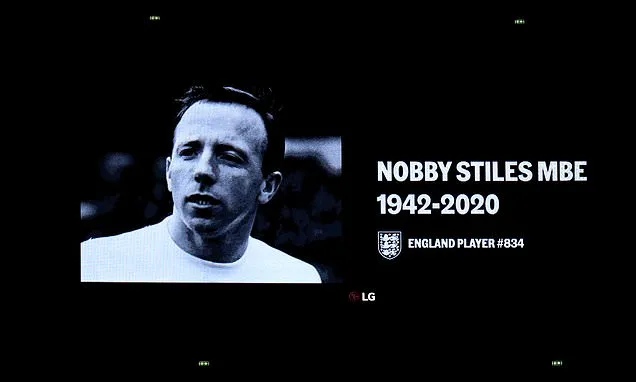The son of England World Cup winner Nobby Stiles has said football "killed" his dad and again called on the sport's authorities to do more to help ex-players and their families cope with a dementia diagnosis.
Former Manchester United midfielder Stiles, who was part of the England team which won the World Cup on home soil in 1966, died in 2020 having lived with dementia for a number of years.
Stiles had been diagnosed with prostate cancer in 2013, but a postmortem examination of his brain found he had chronic traumatic encephalopathy (CTE), a progressive neurodegenerative disease associated with repeated head traumas.
His son John heads up the Football Families for Justice (FFJ) group which is calling on the football authorities to do more to help former players diagnosed with dementia.
He described the Football Brain Health Fund, set up jointly in September 2023 by the Professional Footballers' Association (PFA) and the Premier League with an initial £1million available to support former players and their families with care costs and other support, as "a pittance".
Stiles said his father had been forced to sell medals earned during his playing career to fund his care and told BBC Breakfast: "I was angry because he received no help, and families aren't receiving any help, and it was his job that killed him. We know that, and that's why we're still fighting.
"A fund was created in September 2023, there's a million pounds, and it's a pittance. This is why footballers today are coming together. We've got lots of people backing us. David Beckham sent us a fantastic video.
"He's backing us completely, amongst a load of other players. Nobody else is going to do it. We have to do it. We have to fight to get help for our players who are suffering."
Stiles described the case of former Aston Villa defender Chris Nicholl, who was living with dementia and died aged 77 last February, as a "disgrace". His family applied for financial support under the Football Brain Health Fund, but he died while the application process was ongoing.
Stiles and a group of former players are joining forces with Andy Burnham, the Mayor of Greater Manchester, and Steve Rotheram, the Mayor of the Liverpool City Region, to discuss ways to impose political pressure on the football authorities to do more at a meeting in central Manchester on Friday afternoon.
Among the ex-pros set to be at the meeting is former Manchester United defender David May, who estimates he headed the ball around 20,000 times during his career.
"I'm 55 this year, I'd like to know where I'm going to be in 10 years' time," he said.
"Would I have the care from the governing bodies, from the PFA, the funding that these families now are not actually getting?
"I'm worried, of course I am. I've got a family to look after, and I don't want my children looking after me day in, day out."
The PFA and the Premier League have a confirmed commitment to increase funding to the Football Brain Health Fund beyond £1million.
Separate to the fund, the PFA also offers a dedicated support team which offers personalised guidance to players and families. One of those advisers is Dawn Astle, whose father Jeff played for West Brom and England and whose death from CTE in 2002 was determined to be death by industrial disease by a coroner.
The union also provides free and confidential access to dementia clinics and specialised Admiral Nurses while the Advanced BRAIN Health Clinic in London serves mid-life retired male and female professional footballers and has received more than 100 referrals from the PFA.
These assessments aim to evaluate the deterioration of cognitive function which could help reduce the risk or speed of developing neurodegenerative disease.
Player education sessions on brain health risks are also offered to current players by Astle and others while the union continues to lobby at the global level for the introduction of temporary concussion substitutes.
The FA co-funded the FIELD Study with the PFA which produced the landmark 2019 finding that footballers were three and a half times more likely to die of neurodegenerative disease than age-matched members of the general population.
The latest FIELD update last month found the heightened risk among footballers' was not driven by general health and lifestyle factors.
While it will likely take long-term studies to definitively link repeated heading to an increased risk of developing neurodegenerative disease, the FA has taken steps to reduce the risk in any case and is phasing out all heading in youth football up to under-11s by 2026.
An FA spokesperson said: "We continue to take a leading role in reviewing and improving the safety of our game."
"This includes investing in and supporting multiple projects in order to gain a greater understanding of this area through objective, robust and thorough research.
"We have already taken many proactive steps to review and address potential risk factors which may be associated with football whilst ongoing research continues in this area including liaising with international governing bodies."
The Stiles family is also part of a group which is taking legal action against the FA, the EFL and the International Football Association Board (IFAB), claiming they did not do enough to protect players from the risk of brain injuries.
The PFA has been approached for comment.
